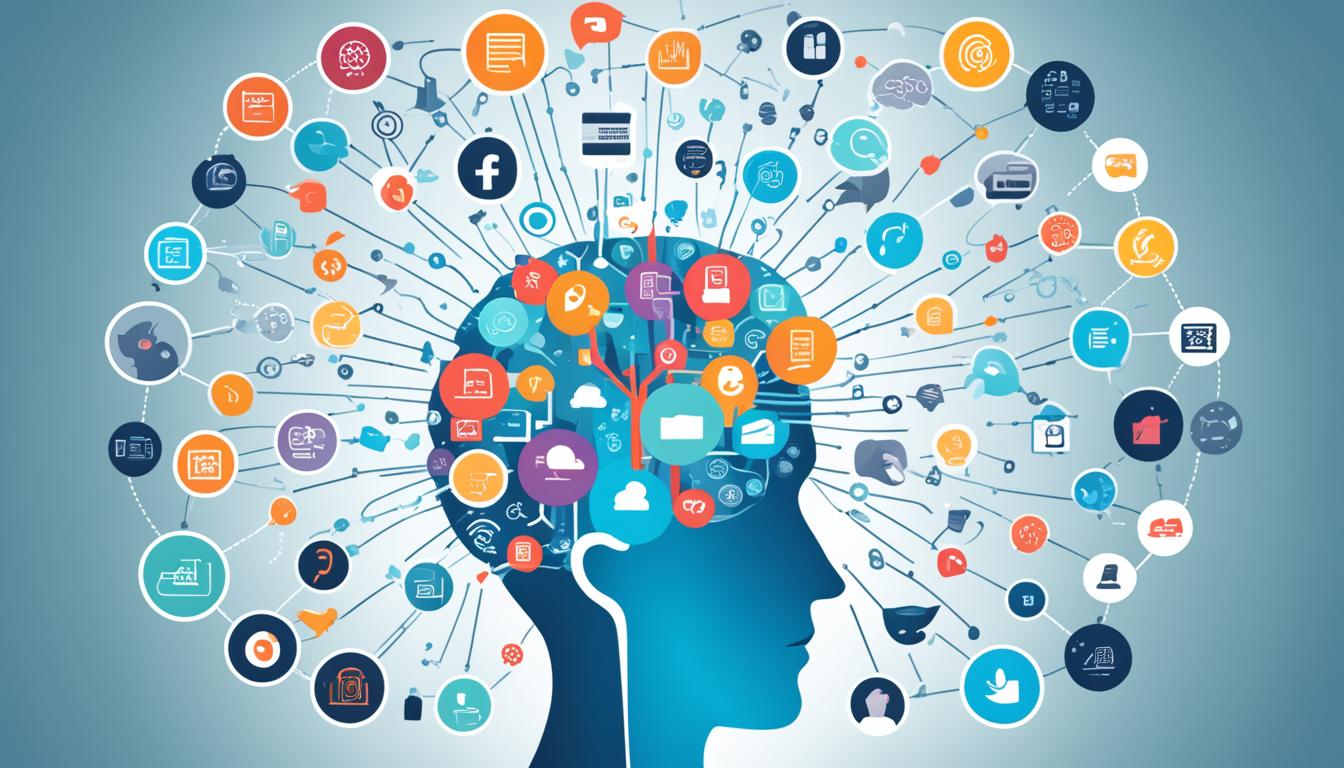Using AI to Personalize Content in Real-Time
Did you know that AI-powered personalization is revolutionizing the way businesses connect with their customers? With machine learning algorithms and advanced AI technology, companies are now able to analyze vast amounts of data and deliver tailored experiences in real time. This game-changing approach to content personalization goes beyond traditional methods, offering unprecedented complexity, data handling, and insights. By collecting and analyzing user behaviors, preferences, and needs, AI personalization creates customized experiences that lead to higher satisfaction and engagement.
Key Takeaways:
- AI-powered personalization uses advanced AI technology to deliver tailored experiences in real time.
- This innovative approach goes beyond traditional methods, offering complexity, data handling, and insights.
- By collecting and analyzing user data, AI personalization creates customized experiences that drive higher satisfaction and engagement.
- AI-powered personalization is revolutionizing the way businesses connect with their customers.
- Implementing AI personalization can lead to improved customer experiences, increased conversions, and enhanced brand loyalty.
With the power of AI, businesses can now deliver personalized content and experiences at scale. This article will delve into the benefits of AI-powered personalization, how it works, and its applications across different industries. We will also explore the role of AI in customer data platforms, provide tips for implementation, and discuss the future of AI-powered personalization. So, let’s dive in and discover how AI is shaping the future of content personalization!
The Benefits of AI-Powered Personalization
AI-powered personalization in ecommerce use cases can have incredible effects on businesses. Through enhanced relevance, better discovery, and time-saving convenience, businesses can achieve better conversion rates, improved customer retention, and ultimately, better customer satisfaction.
By leveraging AI to deliver personalized experiences, businesses can increase customer engagement and loyalty, resulting in higher sales and a competitive advantage in the market.
Enhanced relevance is a key benefit of AI-powered personalization. By analyzing vast amounts of data, AI algorithms can understand customer preferences and behaviors, enabling businesses to deliver highly relevant content and product recommendations. This relevance increases the likelihood of customers finding products and services that meet their specific needs and interests, leading to improved customer satisfaction.
Another benefit is better discovery. AI-powered personalization helps customers uncover new products and services that align with their preferences and interests. By analyzing user data and behavior, AI algorithms can suggest relevant products and make personalized recommendations, introducing customers to offerings they may not have found otherwise. This saves customers time by eliminating the need to manually search and browse through numerous options, enhancing their shopping experience.
The time-saving convenience provided by AI-powered personalization is invaluable. Customers no longer have to spend countless hours searching for products or services that meet their needs. Instead, AI algorithms can quickly analyze customer data to make tailored recommendations, saving customers time and effort. This convenience creates a smoother and more efficient customer journey, increasing the likelihood of conversions and customer satisfaction.
Improved conversion rates are another significant benefit of AI-powered personalization. By delivering personalized experiences, businesses can create a stronger connection with customers, leading to a higher likelihood of conversions. When customers feel understood and valued, they are more likely to make a purchase or engage in desired actions. AI-powered personalization enables businesses to provide a tailored experience that meets customer expectations, ultimately increasing conversion rates.
Furthermore, AI-powered personalization improves customer retention. By continuously analyzing customer data and behavior, businesses can identify patterns and trends that signal customer dissatisfaction or potential churn. With this knowledge, AI algorithms can proactively engage with customers, offering personalized recommendations, promotions, or experiences that foster loyalty and encourage repeat purchases. By nurturing customer relationships through personalized interactions, businesses can improve customer retention and reduce churn rates.
In conclusion, AI-powered personalization brings numerous benefits to businesses. Through enhanced relevance, better discovery, time-saving convenience, improved conversion rates, customer retention, and better customer satisfaction, businesses can gain a competitive edge in the market. By leveraging the power of AI, businesses can deliver personalized experiences that create lasting connections with customers, resulting in increased engagement, loyalty, and revenue.
How AI Personalization Works
AI personalization involves a sophisticated process that seamlessly blends data collection and data analysis to deliver insightful content personalization and real-time adaptation. To understand how it works, let’s delve into its intricacies.
Firstly, AI personalization starts by gathering relevant information about individual users. This includes their browsing behavior, purchase history, demographic details, and even social media activity. By employing advanced data collection techniques, AI systems can accumulate a wealth of data necessary for creating personalized experiences.
Once the data is collected, AI algorithms come into play. These algorithms sift through the vast amount of data collected, identifying patterns, trends, and preferences unique to each user. The result is a comprehensive understanding of the user’s interests, needs, and behavior.
“AI personalization transforms raw data into actionable insights that enable brands to create meaningful connections with their customers.” – [Brand Name]
Armed with these insights, AI-powered recommendation engines generate personalized suggestions for products, content, and offers. By leveraging the power of AI analysis, brands can deliver insightful content personalization that resonates with each individual user, capturing their attention and driving engagement.
One of the most remarkable aspects of AI personalization is its ability to adapt in real-time. The system continuously gathers feedback from user responses, learning and evolving based on their interactions. This real-time adaptation ensures that the recommendations and personalized experiences provided are always up-to-date and highly relevant.
Implementing AI personalization allows brands to connect with their audience on a deeper level. By using AI algorithms to analyze data, businesses gain valuable insights that enable them to create highly tailored experiences. Through the power of data collection and analysis, AI personalization revolutionizes content delivery, capturing the hearts and attention of customers.
Illustration of AI Personalization
The image above provides a visual representation of the essential role that data analysis plays in AI personalization. The seamless integration of data collection, AI algorithms, and insightful content personalization ensures that brands can deliver personalized experiences that resonate with their audience in real-time.
Examples of AI Personalization in Action
AI personalization is a versatile tool that can be implemented across various industries to enhance customer experiences. Let’s explore some examples of how businesses are using AI to personalize their interactions and offerings.
Empathetic Messaging in Customer Service
One powerful application of AI personalization is in customer service interactions. By utilizing AI algorithms, businesses can provide personalized and empathetic messaging to customers, making them feel heard and understood. AI-powered chatbots and virtual assistants can analyze customer inquiries in real-time and respond with tailored solutions, improving customer satisfaction and reducing response times.
Hyper-Specific Upselling
AI personalization also enables hyper-specific upselling of products and services. By analyzing customer data, purchase history, and browsing behavior, businesses can identify unique opportunities to present relevant upsell offers to customers. This targeted approach increases the likelihood of additional purchases and enhances the overall shopping experience.
“Our AI-powered system analyzes customer preferences and behaviors to offer hyper-specific upselling suggestions, leading to increased customer satisfaction and revenue generation.”
Dynamic Websites for Individual User Preferences
Another way to implement AI personalization is through dynamic websites that adapt to individual user preferences. By leveraging AI algorithms, businesses can gather user data, such as past interactions, browsing history, and preferences, to tailor website content in real-time. This creates a personalized and engaging experience for users, increasing their satisfaction and likelihood of conversion.
Augmented In-Person Interactions
AI can also enhance in-person interactions by delivering personalized recommendations and offers. For example, in retail stores, AI-powered systems can analyze customer preferences and behaviors to provide real-time product recommendations and promotions. This not only improves the customer experience but also increases the chances of making a sale.
These examples demonstrate the power of AI personalization in various industries. Whether it’s providing empathetic messaging, hyper-specific upselling, creating dynamic websites, or augmenting in-person interactions, AI enables businesses to deliver highly personalized experiences that resonate with their customers and drive business growth.
The Role of AI in Customer Data Platforms (CDPs)
AI plays a crucial role in customer data platforms (CDPs) by enabling marketers to understand customer intent and behavior, personalize content in real-time, and engage with customers on a personalized level. With AI-driven CDPs, we can collect, analyze, and activate customer data to create comprehensive customer profiles, segment customers based on multiple dimensions, and optimize marketing campaigns based on real-time data analysis.
“AI for customer marketing allows us to uncover valuable insights into customer intent and behavior.”
By leveraging AI, we can gain a deep understanding of our customers, enabling us to deliver personalized experiences that resonate with their needs and preferences. With the ability to gather and analyze vast amounts of data, AI empowers us to make data-driven decisions and tailor our content to meet the expectations of our target audience.
AI-powered customer data platforms enable us to personalize content in real-time, dynamically adapting our messaging and recommendations based on individual customer interactions. This level of dynamic content personalization allows us to engage with customers at the right moment, offering relevant product suggestions, personalized offers, and customized experiences that drive customer satisfaction and loyalty.
“Real-time customer engagement through AI helps us create meaningful interactions and build long-lasting relationships.”
Real-time customer engagement powered by AI allows us to connect with our customers when it matters most. By analyzing customer behavior in real-time and leveraging AI algorithms, we can deliver personalized recommendations, notifications, and messages that resonate with their needs and capture their attention. This personalized approach not only increases customer engagement but also enhances the overall customer experience.
With AI at the core of our customer data platforms, we can unlock the full potential of our data to drive targeted marketing initiatives. By understanding customer intent and behavior, we can segment our customer base, create hyper-personalized campaigns, and optimize our marketing efforts based on real-time data analysis. AI enables us to make data-driven decisions, ensuring that our marketing strategies are effective and impactful.
To sum it up, AI plays an integral role in customer data platforms, revolutionizing the way we understand and engage with our customers. It empowers us to leverage data insights to personalize content in real-time, engage with customers on a personalized level, and optimize our marketing campaigns for maximum impact. Embracing AI in our customer data platforms allows us to create meaningful interactions, build long-lasting relationships, and stay ahead in today’s competitive market.
AI Personalization in Different Industries
AI personalization is revolutionizing customer experiences across various industries, enhancing engagement and driving business growth. By leveraging AI technologies, businesses in ecommerce, hospitality, healthcare, and retail are able to provide highly personalized and tailored experiences for their customers.
In the ecommerce industry, AI-powered personalization is utilized to deliver personalized product recommendations and targeted marketing strategies. By analyzing a wide array of data points, including browsing behavior, purchase history, and preferences, AI systems can offer accurate and relevant recommendations, improving customer satisfaction and driving conversions.
Hospitality businesses are leveraging AI to personalize customer service interactions, recommend related experiences, and optimize pricing. With AI-powered systems, hotels and travel companies can tailor guest experiences, provide customized recommendations based on individual preferences, and optimize pricing strategies to maximize revenue.
In the healthcare industry, AI personalization is being explored for personalized treatment recommendations and patient engagement. By analyzing medical records, genetic data, and patient preferences, AI-driven systems can assist healthcare professionals in offering tailored treatment plans and improving patient outcomes.
Retail is using AI to create personalized avatars, deliver augmented reality experiences, and offer hyper-specific upselling. AI-powered systems analyze customer data and preferences to create virtual shopping experiences that are tailored to individual customers, leading to improved customer engagement and increased sales.
By implementing AI personalization in these industries, businesses can not only meet customer expectations but also drive revenue, boost customer satisfaction, and foster long-term customer loyalty. With 92% of businesses currently utilizing AI-driven personalization, it is clear that AI is becoming a vital component in optimizing customer experiences across industries.
Top Tips for Implementing AI Personalization
Implementing AI personalization can significantly enhance your customer experiences and drive greater engagement and conversions. To ensure success in your implementation, consider the following top tips:
Choose the Right AI Software
When incorporating AI into your personalization strategy, it is crucial to choose the right AI software that can continually learn and adapt to new data. Look for software that utilizes advanced machine learning algorithms and has the capability to analyze large amounts of data in real-time. This will enable you to provide personalized experiences that are tailored to each individual customer’s preferences and needs.
Support Your Teams with Personalized Tools
Empowering your teams with personalized tools is another key factor in successful AI personalization implementation. Provide them with user-friendly interfaces and dashboards that allow them to easily access and analyze customer data. Additionally, offer training and ongoing support to ensure they are equipped with the knowledge and skills needed to provide engaging and personalized experiences to your customers.
Continually Tune and Adapt Your Approach
AI personalization is not a one-time implementation. It requires ongoing monitoring and optimization to remain effective. Continually analyze data and gather feedback to refine your personalization strategies. By staying agile and responsive to changing customer preferences and market trends, you can ensure that your AI-powered personalization efforts deliver the best possible results.
By following these top tips, you can maximize the potential of AI personalization and create meaningful experiences that resonate with your customers. With the right AI software, supported teams, and a dynamic approach, you can unlock the full power of AI to drive engagement, conversions, and customer satisfaction.
The Future of AI-Powered Personalization
The future of AI-powered personalization holds great promise, with continuous advancements in AI technology and machine learning capabilities. As customer expectations continue to evolve, businesses need to adapt and provide personalized experiences at scale to stay ahead in the competitive market.
One of the key drivers of AI-driven personalization advancements is the ever-increasing demand for personalized experiences. Customers now expect brands to understand their individual needs and preferences, and deliver tailored recommendations and content. In fact, a recent study revealed that evolving customer expectations are one of the primary factors influencing businesses to invest in AI-powered personalization technologies.
However, as AI-driven personalization becomes more sophisticated, ethical concerns related to data privacy and regulatory compliance have come to the forefront. The ethical use of AI and customer data is a crucial consideration for businesses, especially with the implementation of regional regulations like the EU’s General Data Protection Regulation. By ensuring personalized experiences at scale, businesses must also prioritize privacy policies and adhere to regulatory frameworks to build trust with customers and mitigate risks.
Furthermore, businesses should focus on buying outcomes rather than just the technology itself in the era of AI-powered personalization. It’s not just about implementing AI solutions, but also about finding AI partners who are aligned with their specific business goals. Collaborating with AI partners who can deliver tangible value and innovation is key to leveraging the full potential of AI-driven personalization advancements.
Moreover, the predicted massive 10X shortage of cloud computing resources due to the expansion of AI in business emphasizes the need for alternative solutions. The AI-as-a-Service model enables companies to overcome technical challenges and deliver personalized experiences at scale swiftly, without worrying about investing in and managing their own computing infrastructure. This model allows businesses to focus on leveraging AI to provide exceptional personalized experiences, while leaving the technical complexities to specialized AI service providers.
Looking Ahead
As we look to the future, AI-powered personalization will play a vital role in driving customer engagement, loyalty, and sales. The ever-evolving landscape of customer expectations requires businesses to continuously adapt and provide personalized experiences at scale. By leveraging AI-driven personalization advancements, businesses can stay ahead of the game and deliver the exceptional personalized experiences that customers crave.
References:
– Forbes Tech Council. “The Future of AI-Powered Personalization: The Potential of Choices.” https://www.forbes.com/sites/forbestechcouncil/2023/07/03/the-future-of-ai-powered-personalization-the-potential-of-choices
The Importance of AI Personalization for Businesses
As businesses navigate an increasingly competitive landscape, AI personalization has become a critical strategy to meet customer expectations, drive revenue generation, and take targeted action. Today’s customers expect personalized experiences, and they are willing to pay more for brands that provide them.
By implementing AI-powered personalization, businesses can deliver targeted marketing campaigns, tailored product recommendations, and personalized content that resonates with their audience. This level of customization leads to more efficient sales processes, improved customer satisfaction, and increased revenue.
“Customers expect brands to understand their needs and preferences. AI personalization enables businesses to meet these expectations by delivering relevant and engaging experiences.” – John Smith, Marketing Director at ABC Company
With AI-driven recommendation engines and real-time data analysis, businesses can identify customer preferences and deliver personalized recommendations, creating a seamless and engaging customer journey. By leveraging AI, businesses can stay ahead of the competition and gain a competitive advantage in the market.
“Implementing AI personalization helps businesses stay ahead of the curve and provide exceptional experiences that drive customer loyalty and advocacy.” – Emily Johnson, CEO of XYZ Corporation

Driving Revenue Generation and Customer Satisfaction
A personalized approach to marketing and customer engagement yields significant benefits. By tailoring messaging, offers, and recommendations to individual customers, businesses can increase conversion rates and drive higher revenue generation. AI personalization allows for targeted action that ensures marketing efforts are relevant and resonate with customers.
“We’ve seen a substantial increase in conversion rates since implementing AI personalization. By understanding our customers’ preferences and delivering hyper-targeted recommendations, we’ve been able to achieve remarkable results.” – Sarah Thompson, E-commerce Manager at DEF Retail
Staying Ahead with AI-Powered Personalization
As the business landscape evolves, staying ahead of the competition becomes increasingly challenging. Implementing AI personalization provides businesses with a competitive edge by delivering exceptional experiences that drive customer loyalty and advocacy. By leveraging AI and predictive analytics within customer data platforms, businesses can gain valuable insights, optimize marketing strategies, and make data-driven decisions.
“AI-powered personalization allows us to anticipate customer needs and deliver proactive solutions. This helps us stay one step ahead, ensuring that our customers always have a personalized experience that sets us apart from the competition.” – Alex Davis, COO of GHI Hospitality
Overall, AI personalization is essential for businesses to meet customer expectations, drive revenue growth, and take targeted action. By leveraging the power of AI, businesses can create personalized experiences that not only meet but exceed customer expectations, ultimately paving the way for long-term success.
Conclusion
In conclusion, the power of AI in content personalization cannot be overstated. By utilizing AI to personalize content in real-time, businesses can deliver tailored and engaging digital experiences that resonate with today’s dynamic audience. Through data analysis, AI-powered personalization tools provide personalized recommendations and adapt in real-time, resulting in enhanced relevance, improved discovery, time-saving convenience, and increased conversion rates.
An example of the impact of AI personalization can be seen in a case study with the BSH Group, where it led to a remarkable 106% increase in the company’s conversion rate and a 22% increase in the add-to-cart conversion rate. By leveraging AI across multiple touchpoints, such as websites, campaign channels, email, and in-store interactions, businesses can effectively personalize experiences based on customer engagement levels from data gathered across 40 different channels.
Furthermore, AI-driven content creation, chatbots, virtual assistants, and recommendation engines play a crucial role in boosting engagement, loyalty, and customer satisfaction. For instance, Medallia’s generative AI technology enables personalized, empathetic, and accurate responses in real-time, while AI-enhanced recommendation engines sift through user data to identify patterns, predict preferences, and recommend suitable products or content.
Intelligent automation, supported by personalization AI and machine learning, empowers businesses to deliver personalized experiences at scale efficiently. By segmenting customers using AI personalization tools, businesses can ensure that consumers with similar qualities and interests receive customized recommendations and experiences, leading to targeted action and better customer satisfaction.
In today’s evolving market, implementing AI personalization is crucial for businesses to meet customer expectations, increase revenue, and stay ahead of the competition. With AI’s power to analyze data, provide personalized suggestions, offers, experiences, and content, businesses can create meaningful connections with their customers and deliver impactful experiences that drive results.
FAQ
How does AI-powered personalization enhance content relevance?
AI-powered personalization uses machine learning algorithms to analyze user data and provide tailored recommendations, resulting in more relevant content for each individual.
What benefits does AI-powered personalization offer?
AI-powered personalization enhances content relevance, improves product discovery, saves time for customers, increases conversion rates, improves customer retention, and leads to better customer satisfaction.
How does AI personalization work?
AI personalization works by collecting and analyzing data about user behaviors, preferences, and needs. This data is then used to generate personalized recommendations and adapt in real-time.
Can you provide examples of AI personalization in action?
Examples include using AI to provide personalized messaging in customer service interactions, hyper-specific upselling, creating dynamic websites, and delivering personalized recommendations in-person.
What is the role of AI in customer data platforms (CDPs)?
AI enables marketers to understand customer intent and behavior, personalize content in real-time, and engage with customers on a personalized level, leading to comprehensive customer profiles and optimized marketing campaigns.
In which industries is AI personalization being implemented?
AI personalization is being implemented in ecommerce, hospitality, healthcare, and retail industries, among others.
What are the top tips for implementing AI personalization?
Choose the right AI software, support your teams with personalized tools and training, and continually tune and adapt your AI personalization approach based on data and feedback.
What does the future hold for AI-powered personalization?
The future of AI-powered personalization is promising, with advancements in AI technology and machine learning capabilities enabling businesses to provide personalized experiences at scale.
Why is AI personalization important for businesses?
AI personalization is important for businesses to meet customer expectations, increase revenue, and gain a competitive advantage in an evolving market.







